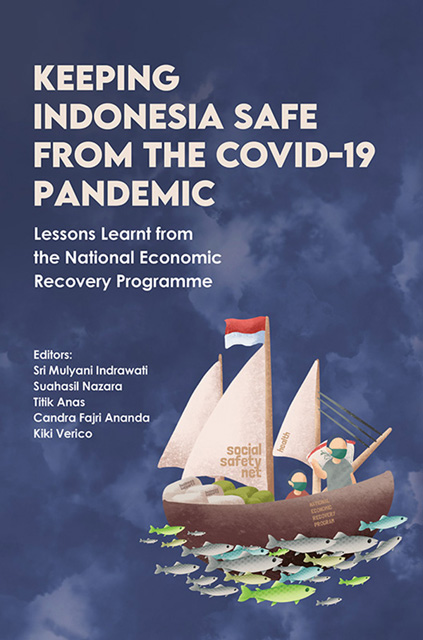 Keeping Indonesia Safe from the COVID-19 Pandemic
Keeping Indonesia Safe from the COVID-19 Pandemic Book contents
- Frontmatter
- Contents
- List of Figures
- List of Tables
- List of Boxes, Annexes and Appendixes
- Acknowledgements
- Glossary
- The Contributors
- Foreword: Keeping Indonesia Safe from the COVID-19 Pandemic Lessons Learnt from the National Economic Recovery Programme
- Part I Health Shock
- Part II Economic Shock: The Framework
- Part III Revenue Shock And Response
- Part IV Expenditure Side (Human Capital)
- Part V Expenditure Side (Msmes And Corporate Sector)
- Part VI Regional Dynamics
- Part VII New Ways Of Working
- Index
1 - Keeping Indonesia Safe during the Pandemic 2020â21
Published online by Cambridge University Press: 30 June 2023
- Frontmatter
- Contents
- List of Figures
- List of Tables
- List of Boxes, Annexes and Appendixes
- Acknowledgements
- Glossary
- The Contributors
- Foreword: Keeping Indonesia Safe from the COVID-19 Pandemic Lessons Learnt from the National Economic Recovery Programme
- Part I Health Shock
- Part II Economic Shock: The Framework
- Part III Revenue Shock And Response
- Part IV Expenditure Side (Human Capital)
- Part V Expenditure Side (Msmes And Corporate Sector)
- Part VI Regional Dynamics
- Part VII New Ways Of Working
- Index
Summary
“Either write something worth reading or do something worth writing (Benjamin Franklin)”
This book is writing something worth reading about the effective policy known as Program Pemulihan Ekonomi (PEN) of Indonesia in 2020 and 2021
SETTING THE SCENE
The World Health Organization (WHO) detected cases of “viral pneumonia” in Wuhan city in the People's Republic of China on 31 December 2019. The virus was later named COVID-19 (World Health Organization 2022). In January 2020, several countries reported their first cases of COVID-19, including Thailand on 13 January 2020, Japan on 15 January 2020, France on 21 January 2020, and the United States on 24 January 2020. At that time, Indonesia had not yet found any cases although the screening and preparedness to detect the virus had been in place, including the installation of thermal scanners at major airports and the appointment of more than a hundred COVID-19 hospitals. Indonesia had also imposed international travel restrictions from 1 January 2020, temporarily suspended all flights connecting Indonesia and China and imports of live animal products from China. The first cases of COVID-19 in Indonesia were detected and reported on 2 March 2020.
WHO and the Chinese health authorities closely studied the virus from its first discovery. On 24 February 2020, the WHO-China mission on COVID-19 reported the main findings of their mission and highlighted the importance of large-scale implementation of non-pharmaceutical public health measures, COVID-19 case detection and isolation, contact tracing and monitoring/quarantining as well as community engagement to control the COVID-19 transmission and reduce illness and death resulting from the COVID-19 infection (World Health Organization 2022). WHO declared COVID-19 as a pandemic on 11 March 2020 and regularly updated the COVID-19 situation and recommended measures to address the pandemic and mobilized resources on a global scale to handle the pandemic.
Many countries began to close their borders and implemented the measures recommended by WHO, including lockdowns. China took more extreme measures than what was recommended by WHO, locking down the city of Wuhan and other cities in Hubei province on 23 January 2020, to quarantine the centre of the COVID-19 outbreak.
- Type
- Chapter
- Information
- Keeping Indonesia Safe from the COVID-19 PandemicLessons Learnt from the National Economic Recovery Programme, pp. 3 - 26Publisher: ISEAS–Yusof Ishak InstitutePrint publication year: 2022


